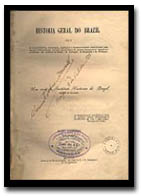


|
VARNHAGEN,
Francisco Adolpho. Historia Geral do
Brazil, isto é, do descobrimento,
colonisação,
legislação e desenvolvimento deste
Estado....Rio
de Janeiro: Laemmert, 1854.
Francisco Adolfo de Varnhagen was born in 1816 in
São João de Ipanema, in the municipality of Sorocaba, in the province of
São Paulo. At the age of eight he was sent to study in Portugal, where he graduated.
He joined the army as an engineer, but soon left it to become a diplomat. This activity enabled
him to dedicate himself to historical research in the European archives, which allowed him not
only to obtain detailed and original information on the Portuguese colonising experience in
America but also revealed many of the colonial chroniclers whose works remained forgotten or
unknown, and to which he wrote scholarly introductions. A thorough and tireless researcher,
although not always informative as to the source of the found documents, he was responsible
for finding the tomb of Pedro Álvares Cabral in the presbytery of the Convento da
Graça in Santarém (Portugal) in 1838. In the opinion of Capistrano de Abreu,
"Varnhagen's findings were considerable, above all for the first century of our history. We
would not claim that he renewed the physiognomy of the epoch, but he did discover many elements
for whoever is able and wants to write a definitive work ".
His História Geral do Brasil, the first
volume of which was published in 1854, constitutes one of the monuments that characterise the
peak of the Empire in Brazil. Dedicated to Dom Pedro II, the second Emperor of Brazil,
"protector of Letters and the Historical Institute" for his perception of "the value
of the study of national history for the splendour of the nation, the instruction of the
subjects and the good government of the country,", Varnhagen hoped that his
História would contribute to the honour of the monarchy among civilised
nations.
Considered by Oliveira Lima to be "the creator of
National History," Varnhagen and his work received a less favourable evaluation from
José Veríssimo, for whom "Varnhagen's philosophy of history is the Christian
spiritualist philosophy common to his time and in keeping with the moral and political
thinking of his Portuguese education. In history he is a believer in providence, in politics
he is a man on the side of the State, order, authority and the consummated fact."
Made Baron by decree of 24 July 1872, Francisco Adolfo de Varnhagen became Viscount of Porto
Seguro, also by decree, in 1874, four years before his death.
|



